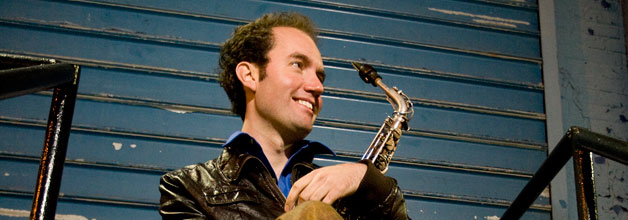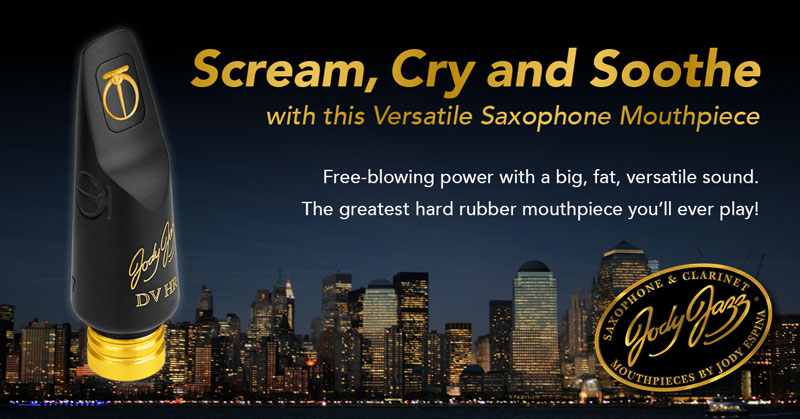The Will Vinson Interview

New York saxophonist Will Vinson is a force to be reckoned with. Hailing from London, Will made the move to New York in 1999 and hasn’t looked back since. The roster of jazz heavyweights that Will’s played with includes Gonzalo Rubalcaba, Kurt Rosenwinkle, Mark Turner, Chris Potter, Geoff Keezer, and many, many more. Not one to limit his horizons to the jazz sphere, Vinson has also shared the stage and studio with Rufus Wainwright, Sufjan Stevens, Sean Lennon, and lots more.
With four critically-acclaimed solo albums to his name (two of which were released in 2010 alone), Will shows no sign of slowing down. On any given week he can be heard at venues throughout New York and elsewhere around the world. From small clubs to major-league concert tours, Will’s bop-based yet thoroughly modern approach to music leaves an impression that’s not easy to forget.
The Interview
Doron Orenstein: What was it that inspired you as a youngster to take your playing from a student level to aspirations of a career in music?
Will Vinson: Like most young people (I assume) who show a great level of enthusiasm and, I hope, a scrap of talent, I found myself constantly reminded by all the responsible influences around me (parents, music teachers etc) just how hard it would be to try to pursue a professional future in music. The one counsel I remember most vividly came from my jazz piano teacher in London, a great and inspirational musician and educator called Leon Cohen. I paraphrase slightly, but he said, basically, “don’t do it unless you’d rather be dead than do anything else”. That sounded so romantic and hip that it had the no doubt unintended consequence of helping me make up my mind that this is what I wanted to do. But more broadly (and, at the same time, specifically), of course, there were a handful of musicians that fueled the ultimately irresistible impulse to be a jazz musician. They were,in no particular order (and don’t expect to notice them right away in my playing) Stan Getz, Lester Young, Bill Evans, Duke Ellington and Count Basie. A little later I skipped straight to Weather Report and Keith Jarrett, but I think it’s fair to say my mind was made up by then. We’re talking about the age of about 12-13, I think. Exactly the period of a kid’s life when he has the least possible idea what it can possibly mean to make a living in anything!
DO: It’s obvious to me that you are able to hear some great melodic ideas very clearly. What are some of the things you’ve done in terms of ear training?
WV: There’s two basic things that took a foothold in my mind very early on. They’re not unconventional, but when it comes to learning the nuts and bolts of a discipline, there’s something to be said for convention. It’s something the classical world has been developing for centuries, and that’s an advantage in learning that they have over us (we have plenty of our own advantages, of course).
The first was an intuitive attribution of certain not-necessarily-musical attributes to various sounds, pitches and harmonies. Even personality traits. For example (and I’m making this up – these are not all examples of the way I think of these things, but that’s the point – you need to find your own), the fifth degree of a scale is regal; the major sixth is a non-comittal dreamer; the dominant sus chord is a borish poser; the lydian major seven is bi-polar, and so on. I think some of those associations occur to us even before we start to learn harmony, and then we suppress them for whatever reason, as our knowledge grows.
The second is to get into the habit of working out what’s going on every time you hear something that appeals to you (it’s very hard for me to find the patience if I’m not particularly interested) and you don’t know what it is. It certainly helps to have some piano skills, however rudimentary and slow, for this. In fact it’s hard for me to imagine being able to do this without a keyboard. If you haven’t spent much time transcribing (be it lines or harmonies), it will be slow at first, but it will get much much quicker.
DO: I’m coming to see that much of my own improvisation consists of hearing certain melodic shapes and then filling in the notes within those shapes by playing things that fall under my fingers, as opposed to being able to hear each and every single note I play – no matter how fast the notes are flying by. Is it reasonable to expect that I might eventually be able to clearly hear every single note I play, or do you think that there’s a certain amount of “letting your fingers do walking” with even the greatest improvisors?
WV: Well, it’s certainly not for me to say what I think the greatest improvisers were doing! But I guess we know it when we hear it. Still, I can think of plenty of improvisers who seem almost magically above such things. I also know from experience that, when I listen to myself on recordings, the parts where I’m accurately executing something that I’ve worked out and think is cool are in fact the least impressive, and certainly the least memorable. That’s one more reason why listening to yourself regularly, and with a critical ear, is so important. In this age where everyone and her dog can play all over Countdown in 13 at 350 bpm (ok, I’m exaggerating a bit), it’s the vulnerable moments of sincere improvisation that are the most powerful, and rarest. I’m completely including myself in that analysis, and am working on ways to correct that. It’s a real challenge to work on improvising in a way where every note really does count. It requires resisting the temptation to prove anything at all. Everyone should know their own playing well enough to know whether they’re actually achieving that.
DO: For people who only have a small amount of time to practice each week, what would you suggest they focus on?
WV: Yikes, that’s a very hard question to answer in such a broad context. It really depends on the player. As with anyone, it’s a case of isolating the weaknesses that stick out in your playing and being as efficient as you can be, in the time you have, at addressing them. We all have to do that, of course, but there’s nothing like sparsity of time for focusing the mind. Needless to say, you can have all the time in the world, but if you’re not making good use of that time, it’s not much of an advantage.
DO: I see that you’ve played with folks like Rufus Wainwright, Sufjan Stevens, Sean Lennon and others. What adjustments do you make when you’re playing in musical situations that are outside the sphere of straight ahead jazz?
WV: Beyond learning to be the best sideman you can be on a purely professional level (basically being able to do as you’re told, and accept it when your instincts are overridden), the lessons that are really worth absorbing are the ones that you can take with you to your own music. In my experience, even though there are lots of things we have as jazz musicians that many pop artists don’t, one thing they are very good at is economy. They’re very intolerant of information for information’s sake. This is something I really admire and wish I had a bit more of in my own playing.
DO: Who are the alto players relatively new to the scene that you think we should all be checking out?
WV: Well, I’m relatively new, so you can check me out! Seriously, though, it’s a very daunting thing to play an instrument so closely and specifically identified with the history and development of modern jazz. The guys I like are the ones who can’t easily be mistaken for anyone else. That’s a hard thing to achieve, and I think Logan Richardson and Ben Van Gelder in particular are really doing it.
DO: What in your musical journey are you most excited about at the moment?
WV: I’m always looking forward to the next thing, be it a recording project or a new touring opportunity. I put out two records last year, The World (Through My Shoes) on 19/8 Records, and Stockholm Syndrome on Criss Cross, so I’m going to relax for a while on that front while I formulate the next project in my mind. Meanwhile I’ll be playing several places this year with my band that I haven’t yet visited. The ones in the near future that I’m particularly looking forward to are Missoula, Montana (the state I’ve always most wanted to visit), and the Amazonas Festival in Manaus, Brazil. I try not to forget how lucky I am to be able to not only do the thing I love, but also to be able to do it all over the world.
Will’s Setup
Alto Sax:
Borgani- sterling silver plated
Ted Klum mouthpiece
Hemke #3 Reeds
Soprano Sax:
Borgani – sterling silverplated
Vandoren Mouthpiece
Hemke #3 Reeds






How to Use Breath Support to Fatten Your Sound and Fix Intonation » Best. Saxophone. Website. Ever.
July 10, 2023 @ 7:45 am
[…] time ago, I had the privilege of a private lesson with the great altoist, Will Vinson (here’s a link to an ancient interview I did with him many years ago). I told him that I was struggling with a thin and shrill quality in […]